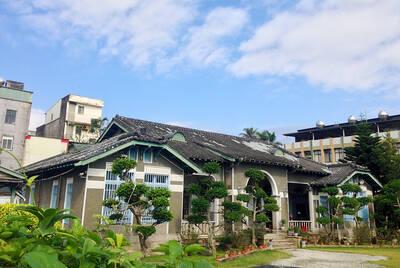First it was Zhao Wei
At the World Chinese Music Awards last weekend in Shanghai, security, which in China is usually zealous if not always competent, was unable to prevent fans from stretching out their hands and molesting Ken Chu, Gigi and Nicholas Tse as they walked the red carpet into the venue. Nicholas even suffered a cut that drew blood. Things went from bad to worse for Gigi when the award she won broke in half and part of it dropped onto her knee making it hard for her to walk.

TAIIPEI TIMES FILE PHOTO
Cecelia Cheung had her own run in with an out-of-control fan at a show in Chongqing when a man rushed the stage, grabbed her and touched her breasts before he was jerked off stage by security [outrageous, ed]. Hong Kong's gossip media that trail Cecilia round the clock insinuated that she may have brought the attack upon herself with her supposedly strange behavior of late. By strange, they mean her increasingly outlandish clothes, tattoos, Buddhist bead bracelets and the voodoo doll she was photographed with a couple weeks ago. There were rumors in the city's papers that she was using the voodoo doll to take revenge on her former boyfriend Nicholas Tse, who dropped her like a dirty tissue for Faye Wong (

TAIPEI TIMES FILE PHOTO
As annoying as the crazed fans in China may be, it seems that the mainland is where the big bucks are for stars these days, according to The Great Daily News (
Not surprisingly, Jay is also at the top of the heap in album sales. The most recent summer sales figures show Jay as having sold 305,000 copies of his latest album, which was named after his mother Ye Hui-mei (
Though not stars on the level of Jay and company, yet still household names in Taiwan -- partly because of a four-person sex scandal dating from last year -- ?the rock band Chairman (
Another Taipei show to look forward to that Pop Stop has learnt about from the owners of Room 18 is British R&B sensation Craig David. The venue is set for the National Taiwan University gymnasium, on Oct. 24. The organizers wouldn't say whether Craig would show up at their club after the show.

From the last quarter of 2001, research shows that real housing prices nearly tripled (before a 2012 law to enforce housing price registration, researchers tracked a few large real estate firms to estimate housing price behavior). Incomes have not kept pace, though this has not yet led to defaults. Instead, an increasing chunk of household income goes to mortgage payments. This suggests that even if incomes grow, the mortgage squeeze will still make voters feel like their paychecks won’t stretch to cover expenses. The housing price rises in the last two decades are now driving higher rents. The rental market

July 21 to July 27 If the “Taiwan Independence Association” (TIA) incident had happened four years earlier, it probably wouldn’t have caused much of an uproar. But the arrest of four young suspected independence activists in the early hours of May 9, 1991, sparked outrage, with many denouncing it as a return to the White Terror — a time when anyone could be detained for suspected seditious activity. Not only had martial law been lifted in 1987, just days earlier on May 1, the government had abolished the Temporary Provisions Effective During the Period of National Mobilization for Suppression of the Communist

When life gives you trees, make paper. That was one of the first thoughts to cross my mind as I explored what’s now called Chung Hsing Cultural and Creative Park (中興文化創意園區, CHCCP) in Yilan County’s Wujie Township (五結). Northeast Taiwan boasts an abundance of forest resources. Yilan County is home to both Taipingshan National Forest Recreation Area (太平山國家森林遊樂區) — by far the largest reserve of its kind in the country — and Makauy Ecological Park (馬告生態園區, see “Towering trees and a tranquil lake” in the May 13, 2022 edition of this newspaper). So it was inevitable that industrial-scale paper making would

Hualien lawmaker Fu Kun-chi (傅?萁) is the prime target of the recall campaigns. They want to bring him and everything he represents crashing down. This is an existential test for Fu and a critical symbolic test for the campaigners. It is also a crucial test for both the Chinese Nationalist Party (KMT) and a personal one for party Chairman Eric Chu (朱立倫). Why is Fu such a lightning rod? LOCAL LORD At the dawn of the 2020s, Fu, running as an independent candidate, beat incumbent Democratic Progressive Party (DPP) lawmaker Hsiao Bi-khim (蕭美琴) and a KMT candidate to return to the legislature representing